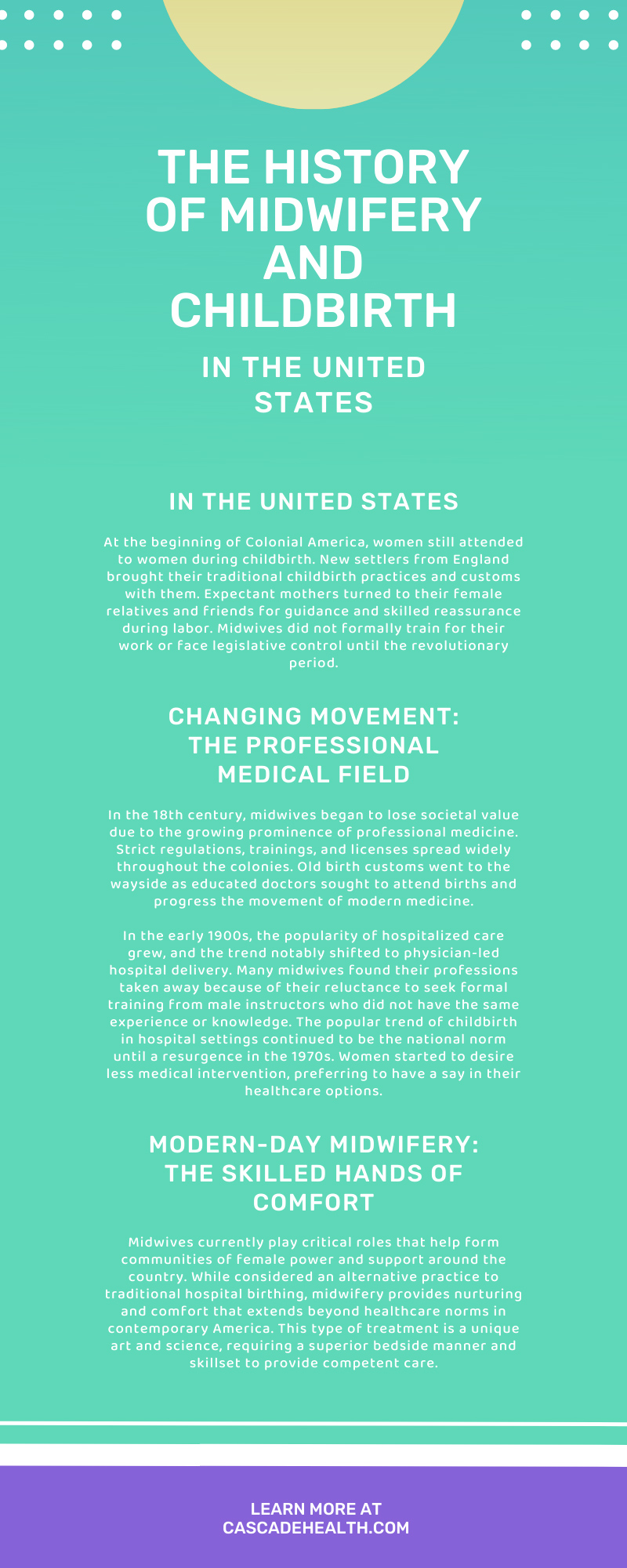The History of Midwifery and Childbirth in the United States
Jul 29th 2022
As the journalist Gail Collins once wrote, “The history of American women is all about leaving home—crossing oceans and continents, or getting jobs and living on their own.” Women have historically blazed a steady trail of change in society through their hard work, knowledge, and activism. The timeless profession of midwifery benefited from these virtues.
Midwifery is a topic deeply ingrained into the history of American women, both immigrant and indigenous. From the beginning of human history to the present, midwives have attended births around the globe. This tradition carried over to the United States after colonization. Women taught critical child birthing skills informally to each other.
Let’s dive deeper into the rich roots of the history of midwifery and childbirth in the United States. Here’s what you should know about this tradition and professional practice to understand its current state in modern society.
Before America: The Worldwide Cultural Origin
As mentioned previously, the origins of midwifery lie in centuries-old times in various areas of the world. Pregnancy and childbirth in the prehistoric past required women to deliver their children in challenging environments. Ergo, women supported these life-threatening occasions by observing other mammals in nature and using skilled knowledge from these observations.
As time went on, childbirth continued to be a difficult and dangerous experience, meaning the skill of midwives became an integral part of societies in different cultures. Each culture had its own birth traditions, but the idea of midwifery was a commonality they shared Women who had attended many births and understood best practices and procedures were pivotal to the social order.
Maternity Care: The Main Domain of Women
During the Middle Ages, the death of a mother or baby during childbirth was relatively common due to complications or a lack of healthy conditions. Medical men could not offer adequate support during childbirth, and their presence was generally considered inappropriate. For this reason, women gained respect for their expert knowledge in attending to other women. Their competence helped reduce to apprehensions, anxieties, and fatalities during births.
This perception of childbirth evolved as European urbanization took over and later set the stage for the migration to Colonial America. The holistic midwifery model of care would both find and lose its place in the United States over the course of several centuries.
Setting the Stage: The Early Age of the American Midwife
At the beginning of Colonial America, women still attended to women during childbirth. New settlers from England brought their traditional childbirth practices and customs with them. Expectant mothers turned to their female relatives and friends for guidance and skilled reassurance during labor. Midwives did not formally train for their work or face legislative control until the revolutionary period.
Changing Movement: The Professional Medical Field
In the 18th century, midwives began to lose societal value due to the growing prominence of professional medicine. Strict regulations, trainings, and licenses spread widely throughout the colonies. Old birth customs went to the wayside as educated doctors sought to attend births and progress the movement of modern medicine.
In the early 1900s, the popularity of hospitalized care grew, and the trend notably shifted to physician-led hospital delivery. Many midwives found their professions taken away because of their reluctance to seek formal training from male instructors who did not have the same experience or knowledge. Even with formal education, midwifery in America became stereotypically considered dangerous.
The popular trend of childbirth in hospital settings continued to be the national norm until a resurgence in the 1970s. Women started to desire less medical intervention, preferring to have a say in their healthcare options. This movement led to a more recent rise in midwifery which widened the modern industry. In the present day, thousands upon thousands of certified midwives provide professional care to expectant mothers nationwide.
Modern-day Midwifery: The Skilled Hands of Comfort
Midwives currently play critical roles that help form communities of female power and support around the country. While considered an alternative practice to traditional hospital birthing, midwifery provides nurturing and comfort that extends beyond healthcare norms in contemporary America. This type of treatment is a unique art and science, requiring a superior bedside manner and skillset to provide competent care.
A Personalized Model of Care
The midwifery model of care sees how pregnancy and childbirth are not one-size-fits-all and require a more personalized and thorough approach. Every expectant mother—and their child—needs individual care according to their unique preferences, needs, and belief systems.
The skilled hands of professional midwives respectfully take care of each birth situation, even those with diverse cultural beliefs or those typically overlooked in society. Midwives offer accessibility and inclusivity and encourage their clients to make informed decisions about their healthcare to attain the best possible birth experience, either at home or at a chosen center.
Midwifery Training and Education Programs
Those interested in this healthcare career can go through various certifications, training, and educational programs to learn how to provide all aspects of midwifery care. Aspiring midwives must seek proper accreditation and get involved in the industry to progress and grow their careers. By continuing to gain professional experience and meet the standards developed by the midwifery community, you can provide excellent care to all women who seek it.
Professional Midwifery Products
By understanding the extensive history of midwifery and childbirth in the United States, we can see how the traditional role has come a long way since its humble beginnings. Those early days didn’t have the latest products and technologies. Today, you can find a wide range of gear to ensure a healthy and successful childbirth experience. Contemporary midwives need to have these materials and equipment on hand for proper training and caregiving. The list of necessary midwifery supplies is long, but the right options don’t need to break the bank.
Look no further than Cascade Health Care for professional birthing supplies. As a trusted supplier, we provide the highest quality and best pricing in the healthcare market. Shop our midwifery supplies of recommended products for all your midwifery needs. Reach out to our customer service team with any questions or inquiries about bulk pricing.


